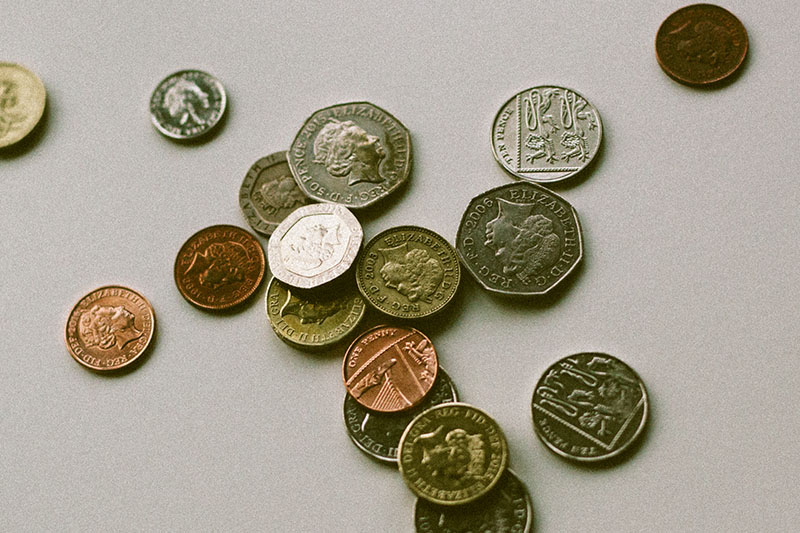There are people who can sit down at a desk once a week or once a month and tally up household expenses by type. Set themselves budgeting goals, then meticulously track where money is leaking so they can stick to their budget. They can keep up these personal audits throughout the year to make sure that not a dime (okay, dollar) is out of place, and consistently make sure their end-of-week goals are hit every time, so that by the end of the year, they’ll have hit their savings target square on the head.
I can’t do that.
Or well, let me clarify, while I could technically do that, I know I absolutely won’t.
If you’re anything like me, chances are very good you do want to save. You want to buff up your emergency savings account and you have a specific amount in mind to hopefully have by the end of the year. You want to have enough for not just a rainy day, but a few months when it happens to pour cats and dogs. But budgeting – not so high up on the list of things you’re happy to do to get yourself there.
So is there a way around this whole budgeting business that still leaves your savings bank account in tip top shape?
Well, actually there is. And it’s nothing new under the sun.

The Easiest Way to Save Without Budgeting
The absolute best way to save money each month when you really don’t want to budget, or just plain don’t think you’d stick to budgeting even if you started doing it, is to take savings money off the top and spend the rest on whatever you want.
In other words:
Once your paycheque hits your bank account, automatically move a certain amount to your savings account, then do as you please with the rest.
Simple. Easy. Straightforward.
Just don’t touch the money you put into your savings account. Never withdraw from it to use on something besides its intended purpose. Set up a boundary in your head that makes this money feel untouchable. Pretend it’s not even there, not even yours. Whatever you need to keep it from burning a hole in your pocket.
Taking money out of this account for anything short of a real emergency, anything sort of what you originally intended this money to be used for – that would completely defeat the purpose of employing this technique.
Don’t touch the money and your savings goal for the week/month/year is guaranteed.
Ways to Maximize the Potential of this Technique
1. Think you may have trouble resisting withdrawing the money? Have your savings account at a different bank.
If your savings money is at a different bank, one you don’t watch as closely, you’ll be less tempted to spend the money in that account, thus making it a lot easier on yourself to keep that money for its intended purpose.
2. Think you’ll have trouble remembering to make the savings deposits? Get your bank to do it automatically.
Many banks give you the option of automatically making the same payment month after month. If you think you may forget to manually do it yourself or if you just want to make your life a little easier and more streamlined, ask the bank to set up an automatic payment to your savings account so you don’t have to do it manually.
3. Have trouble paying the rent & utilities sometimes? Start a second savings account for rent & utilities.
You know how much rent you’re going to be paying over the year. Figure out approximately how much your utilities will be for the year (hint: it’s better to over-estimate), and then start saving what you’ll need by funneling money automatically to a dedicated savings account for rent & utilities. You’ll never be late on your rent again.
4. Have a big-ticket purchase to make? Create another savings account dedicated to it.
Whether you’re saving for a new car, a vacation, a bug out location, college tuition, or just plain want to have more money to prep with: why not set up a separate, dedicated savings account and use this technique to save for that as well?

Benefits to Using This Saving Technique Over Budgeting
What are some of the benefits to saving this way over budgeting?
- If you’re bad at budgeting, you’re still going to be saving money this way.
- If you wouldn’t bother budgeting, again, you’re still going to be saving money if you use this technique.
- You’re sure to hit your weekly/monthly/yearly goals if you deposit the right amount every month and do not withdraw the money. This may not be true of budgeting if you don’t budget well.
- You don’t have to feel guilty about any purchases you made that month. No point auditing what you spent on if you don’t want to: you’ve already saved, the rest is yours to do as you please with.
Disadvantages to This Saving Technique VS Budgeting (& How to Override Them)
Of course, in all fairness, budgeting has one really huge upside to it that this technique does not, as well as another, slightly lesser advantage in my opinion.
The huge benefit budgeting has:
It gives you insight into what you’re really spending your money on.
And this can really benefit you because it can help you:
- See where you are spending a lot of money you don’t want to be spending so much on (clothes & restaurants for instance).
- See where you aren’t spending enough money that you feel you should be spending more on (books, courses, & preps for instance).
How can you get this insight without budgeting: pick a random week or month and audit it. It can give you the same insight as regular budgeting.
Second benefit that budgeting can have:
If you’re really critical about what you’re buying, chances are it will help you save more, as you likely won’t be spending so much on things you don’t need.
But you can save more using this technique, and it’s obvious how: if you want to save more, simply increase the amount you’re funneling away every month to something you’re happier with.
Does This Technique Really Work?
Plainly put, yes.
Personal anecdotes from myself aside (yes, it has been working well for me), there are thousands of testimonials online of saving in this way. Don’t believe me? Do a quick Google search.
In theory, there’s really no question as to whether or not this technique really works. In practicality, it only works insofar as you don’t touch that money in your savings account!
Sounds easy? Well it might just be for you, but it also might not be, which is why you may need to take steps to make it as hard on yourself as possible to withdraw the money for any old reason.

How Do You Save?
Are you happy with the way you save? Do you do so by budgeting or using a technique similar to this?
What has and has not worked for you in the past? What have you been meaning to try out?
Let me know in the comments section down below!
I better start saving, hope it’s not too late though, fingers crossed :D
joe
Never too late!! :)
Elise,
Your advice is simple, practical, straightforward and it works. In the late 80’s we started saving for retirement by setting aside 10% of my gross salary off the top. We never saw the money so we never missed it. We had a good financial planner and put the money to work. We meet twice yearly and make adjustments as we go.
I am now 58 and just retired. We have enough saved to live to 90 and never run out of money.
Yes exactly. Most of the numbers I’ve seen floating around for the perfect percentage to save range from 10-15% of your income – which, well it’s amazing that so small a percent of your total gets you so much over time. It’s not painful if it’s such a small fraction of your paycheque, and yet it makes such an enormous difference.
Congratulations on your retirement ;) and on saving enough to live til you both hit 90! Impressive. Definitely need to be more people following your kind of path!
Elise, I swear you have already read my book!! And the scary thing about this is, ……… I haven’t written it yet, but you somehow have captured many of my concepts on saving and budgeting and the whys and wherefores of such activities.
As my name implies, I am mostly always outdoors, whenever the weather and time out of my life permits. I am definitely NOT an organizational type of person, I have no neat alphabetized pantry, for example, I don’t know how to construct nor use a spreadsheet, and I have no urge to learn at this “senior” stage of my life. I simply let others do the work for me. The bank pays my bills, they transfer a small amount from my “retirement” each month to my savings account, and the rest I pay online with a few swipes of the mouse here and there. I tried the other way back when I had more disposable income to account for but now, on a fixed income, there isn’t a lot to clutter up my math “dept.” in the old brain so I go and enjoy myself instead.
Entering invoices and receipts and what not into a spread sheet or some sort of accounting program each and every month, whatever the amount or how ever many tabs there are to deal with, takes up time in my life that I never could see the sense in laying aside and dedicating to doing such a mechanical, never-have-any-fun-doing type of activity. It’s OK I guess if you don’t have any hobbies or can’t find other things to do but that sounds like such a boring life to begin with that I suppose an additional boring chore added to the foray wouldn’t make a big difference to those people at the end of the day. Rest assured, I am very responsible in paying my bills and I will always have the money to do so each month but I don’t live lavishly nor do I go out and spend money on things I do NOT need. I consider myself frugal but not anal about pinching my pennies.
One thing I noticed, you had an interesting fistfull of pocket change in your hand in one of the accompanying photos, if you ever want to exchange pocket “dumps” of change some day, I used to collect coins (sounds boring doesn’t it, that’s why I quit) but I still find myself falling off the wagon occasionally when I glance through a pile of US coins in search of an old silver content quarter or a wheat penny. Let me know and I will ship you an assortment of US coins for a like assortment of British coins, straight from my “collection jar” where I pitch all of my change, no pick throughs included. It’s all good fun and maybe I will sneak in an old 1940-something penny or dime occasionally. Hey, maybe we will be the beginning of a whole new trend in “saving”, we can start a pocket change exchange club!! I have seen crazier ideas than that take off and become whole new ways of dealing with life.
Do you remember the start of the “Desktop personal computer”?? I do, the first computer I owned was a Commodore Vic-20, it had 20 kilobites of total operating memory, no storage memory, you had to purchase an additional 5 1/4″ floppy disc drive to store anything you wanted to save ….. up to about 360K, and then you had to switch to another blank disc!! Point is, today you can carry your 500 gig personal computer around in your purse or pocket or wear it on your arm! Remember the old comic strip “Dick Tracy”? Of course you don’t, it disappeared from the evening news comic strips before you were born. Probably comic strips were already gone by your date of birth! They had the concept of the personal computer worn on the wrist way back in the 40’s and 50’s in the comics. The comics characters were waaaay ahead of the men and women who drew them, IMHO.
Organizing IS a nice concept though, just not one I would go gaga over ………
We were actually thinking of starting coin collecting. Will give you an email if we do and we’ll do an exchange for sure ;). No time or room right now, though. New hobbies will have to wait until we end up in a house!
Definitely agree on the budgeting front. I can see it as something that would be very helpful to do if you don’t know where your money is going, but if you can make accurate guesses as to how much is leaving your pocket and you’re okay with spending that much on what it’s spent on, I don’t think budgeting is a way you need to spend your time. Using this savings method will leave you plenty in your emergency accounts, retirement savings, whatever you’re saving for.
And that’s why I’d never invest in technology. Only get what you need. It gets better and faster and cheaper over time, so there’s no point in hoarding laptops ever. Really exciting to see what the future holds in terms of tech – hopefully it’ll solve some of our prepper problems ;). Viable home renewable energy and water out of air please!! Oh and home-sized water purifiers, too!